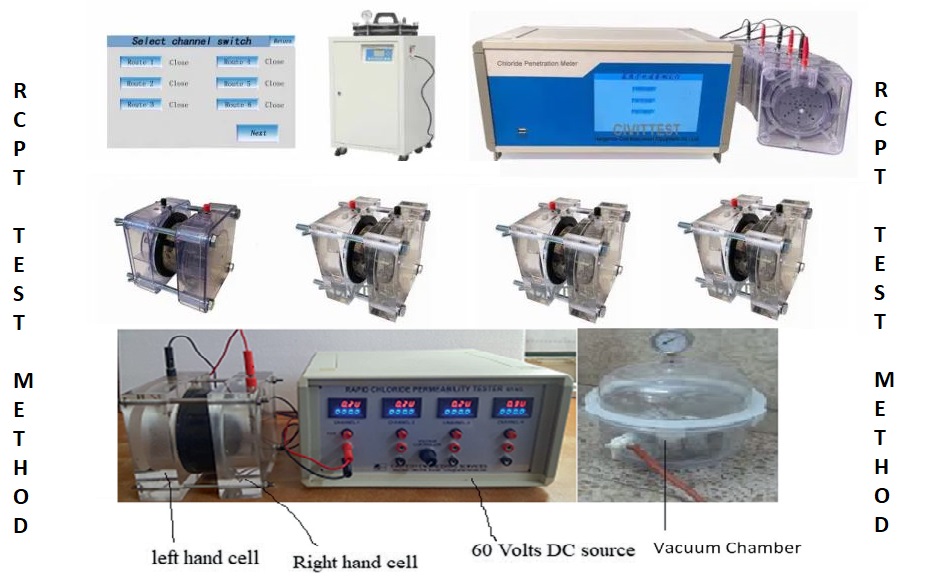The Rapid Chloride Permeability Test (RCPT) is a non-destructive test method used to measure the electrical conductance of concrete to know the durability of concrete. In this test, the electrical conductance is an indication of its permeability to chloride ions. Chloride ions are a major cause of corrosion of steel reinforcement in concrete, so a high RCPT result indicates that the concrete is more permeable to chlorides and therefore more susceptible to corrosion and its durability would be less.
Rapid Chloride Permeability Test- Durability Test of Concrete as Per ASTM C1202
The RCPT is a valuable test method for assessing the durability of concrete and for identifying concrete structures that may be at risk of corrosion.
ASTM C1202 - Standard Test Method for Electrical Indication of Concrete's Ability to Resist Chloride Ion Penetration. This standard specifies the apparatus, test procedure, and interpretation of results for the RCPT. It is widely used by engineers and scientists around the world to assess the durability of concrete.
RCPT- Durability Test of Concrete
This is a non-distributive test to know the lifespan of concrete. Read the below steps to know how the test is performed and at last see the test result limits which is set by the standard.
Equipment Use For RCPT
The RCPT apparatus typically consists of two reservoirs connected by a concrete specimen. The reservoirs are filled with solutions of sodium chloride (NaCl) and sodium hydroxide (NaOH), respectively. A voltage is applied across the specimen, and the current passing through the specimen is measured.
Sample Preparation For RCPT Test
The concrete specimen for the RCPT must be cylindrical with a diameter of 100 mm and a thickness of 50 mm. The specimen must be saturated with water for at least 24 hours before testing.
RCPT Test Procedure
Step-1: Place the saturated concrete specimen between the two reservoirs of the RCPT apparatus.
Step-2: Fill the reservoirs with the NaCl and NaOH solutions.
Step-3: Apply a voltage of 60 V DC across the specimen.
Step-4: Measure the current passing through the specimen at regular intervals for 6 hours.
Step-5: Calculate the total charge passed through the specimen in Coulombs.
Interpretation of Results of RCPT
The RCPT results are interpreted by comparing the total charge passed through the specimen, see the following table.
Concrete with a very high chloride permeability rating is considered to be at high risk of corrosion, while concrete with a very low chloride permeability rating is considered to be at very low risk of corrosion.
| Charge Passed (Coulombs) | Chloride Permeability Rating |
|---|---|
| < 400 | Very low |
| 400 - 1000 | Low |
| 1000 - 2000 | Moderate |
| 2000 - 4000 | High |
| > 4000 | Very high |
Applications of RCPT
The RCPT is a commonly used test method for assessing the durability of concrete. It is used in a variety of applications are:
- Quality control of concrete production.
- Assessment of concrete structures for rehabilitation.
- Investigation of concrete failures.
- Research and development of new concrete materials and construction methods.
The RCPT is a rapid and relatively inexpensive test method, and it can be performed on both laboratory and field samples. It is a valuable tool for assessing the durability of concrete and for identifying concrete structures that may be at risk of corrosion.
FAQs 👉
What is the ASTM Standard for the RCPT Test?
ASTM C1202 is used for RCPT test to know the durability of concrete.
What is the ASTM C1202 Standard?
ASTM C1202 is standard used for rapid chloride permeability test (rcpt) test to know the durability of concrete.
What is the RCPT Stands for in Testing of Concrete Durability?
RCPT stands for Rapid Chloride Permeability Test (RCPT) which is the test method name in the testing of concrete durability.
How is the RCPT Test Calculated?
The RCPT test result is the total charge passed through the specimen. Concrete with a very high chloride permeability rating is considered to be at high risk of corrosion, while concrete with a very low chloride permeability rating is considered to be at very low risk of corrosion.
Rapid Chloride Permeability Test
The RCPT is a valuable test method for assessing the durability of concrete and for identifying concrete structures that may be at risk of corrosion. It is a non-destructive test method used to measure the electrical conductance of concrete to know the durability of concrete. In this test, the electrical conductance is an indication of its permeability to chloride ions. Chloride ions are a major cause of corrosion of steel reinforcement in concrete, so a high RCPT result indicates that the concrete is more permeable to chlorides and therefore more susceptible to corrosion and its durability would be less.



